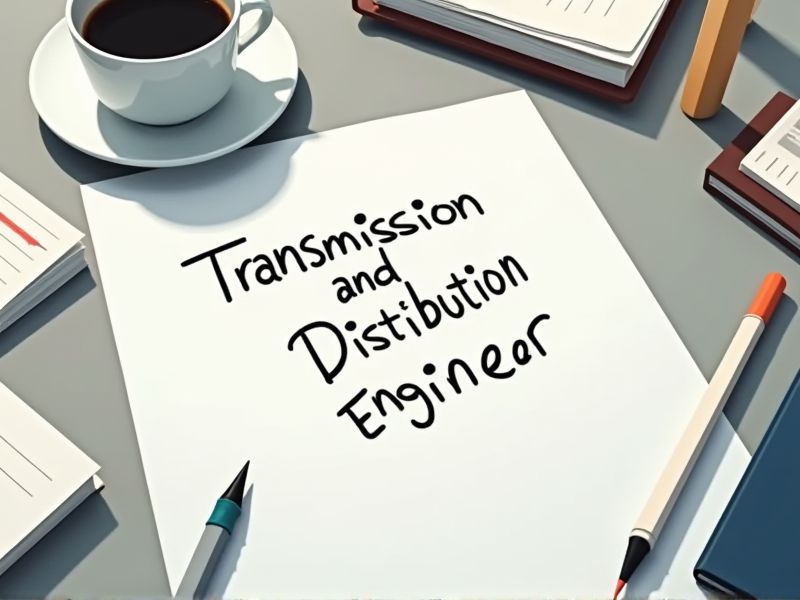
Transmission and Distribution Engineers play a crucial role in ensuring the reliability and efficiency of power systems. Certifications validate their expertise, enhancing their credibility in the industry and expanding job opportunities. With evolving energy technologies and regulatory standards, these certifications ensure engineers are up-to-date with current practices. Here are some key certifications that can be beneficial for Transmission and Distribution Engineers.
Professional Engineer (PE) License
Holding a Professional Engineer (PE) License instills trust in the expertise and capability of a Transmission and Distribution Engineer, affirming their proficiency to undertake projects with public safety in mind. Regulatory compliance often mandates a PE License for signing and sealing engineering documents, ensuring that only qualified individuals oversee critical infrastructure work. Acquiring a PE License signifies adherence to industry standards and best practices, critical for maintaining electrical grid reliability and efficiency. Employers frequently prioritize hiring licensed engineers, recognizing the value added through their credentialed knowledge and practical experience.
Certified Energy Manager (CEM)
Certified Energy Managers possess expertise in evaluating energy efficiency, which helps Transmission and Distribution Engineers optimize the use of energy resources. Their knowledge in energy conservation strategies can lead to reduced operational costs and improved system performance. CEMs can identify and implement renewable energy solutions, aiding engineers in meeting sustainability goals. They bring an understanding of regulatory compliance in energy use, ensuring that engineering projects adhere to current legal frameworks.
Project Management Professional (PMP)
PMP certification equips a Transmission and Distribution Engineer with essential project management skills, leading to more efficient handling of complex projects. This certification instills a structured approach to managing resources, timelines, and budgets, resulting in successful project completion. As energy infrastructure projects become more demanding, having a PMP ensures adherence to best practices and industry standards. Organizations see improved project outcomes and reduced risks when engineers possess both technical expertise and PMP credentials.
NERC Critical Infrastructure Protection (CIP) Certification
Transmission and distribution engineers play a key role in maintaining the reliability of the electrical grid, and NERC CIP Certification ensures they are well-versed in cybersecurity standards. The certification helps engineers understand and mitigate risks that could lead to grid disruptions or outages. Compliance with NERC CIP standards is mandatory for companies, and certified engineers contribute to meeting these regulatory requirements. As cyber threats towards critical infrastructure increase, the certification becomes crucial for safeguarding national security and maintaining public trust.
OSHA Safety Certification
OSHA Safety Certification is crucial for Transmission and Distribution Engineers because it ensures they adhere to safety regulations, reducing the risk of workplace accidents. This certification empowers engineers with knowledge on proper handling of high-voltage equipment, minimizing potential hazards. As safety protocols are updated regularly, having this certification allows engineers to stay current and compliant with federal and industry standards. Companies benefit by lowering accident-related costs and liabilities, enhancing overall operational efficiency.
Six Sigma Green Belt Certification
Achieving Six Sigma Green Belt Certification can enhance a Transmission and Distribution Engineer's ability to identify and eliminate inefficiencies in energy systems. This certification emphasizes data-driven decision-making, leading to improved operational performance and cost reductions in power delivery. A deep understanding of Six Sigma methodologies enables engineers to implement quality control processes that enhance system reliability and safety. Gaining these skills often results in more effective project management and fosters innovation in designing sustainable energy solutions.
Certified Electrical Inspector (CEI)
Certified Electrical Inspectors ensure compliance with industry standards, which reduces the likelihood of costly errors or failures in transmission and distribution systems. Their expertise helps identify potential electrical hazards, promoting safer work environments and preventing accidents. By verifying proper system installation and maintenance, they enhance system reliability and efficiency, leading to fewer outages and disruptions. Employing a CEI can lead to improved project credibility and trust with stakeholders, facilitating smoother project approvals and continued investment.
Smart Grid Certified Professional (SGCP)
The integration of renewable energy sources into the grid necessitates the expertise of an SGCP to efficiently manage and optimize energy distribution. Increasing grid complexity due to smart technologies demands that engineers possess certified skills for seamless operation. Regulations and industry standards require adherence to advanced grid technologies, for which SGCP provides essential knowledge. Rising cybersecurity threats to grid infrastructure make it imperative for engineers to have SGCP certification to effectively implement protective measures.
Reliability, Availability, Maintainability, and Safety (RAMS) Certification
Acquiring a RAMS Certification ensures a Transmission and Distribution Engineer can design systems that are dependable and function as intended, reducing the risk of failures. It emphasizes the importance of system availability, ensuring power networks remain operational to meet consumers' demands. A focus on maintainability allows for efficient repairs and upkeep, minimizing downtime and operational costs. Safety principles embedded in the certification process help prevent accidents and safeguard both employees and infrastructure.
ISO 9001 Lead Auditor Certification
Transmission and Distribution Engineers need ISO 9001 Lead Auditor Certification because it equips them with skills to critically assess and improve quality management systems. Certification ensures compliance with international quality standards, enhancing reliability and safety in power systems. By understanding audit principles, engineers can identify inefficiencies and implement strategies to streamline operations. The certification fosters a culture of continuous improvement, crucial for adapting to changing regulatory and industry demands.
Summary
When you earn certifications as a Transmission and Distribution Engineer, you enhance your professional credibility significantly. This increased credibility may lead to more job opportunities and potential for career advancement. Certified engineers often contribute more effectively to projects, resulting in improved efficiency and safety standards. Achieving certifications can also lead to higher earning potential and job security in the ever-evolving energy sector.
